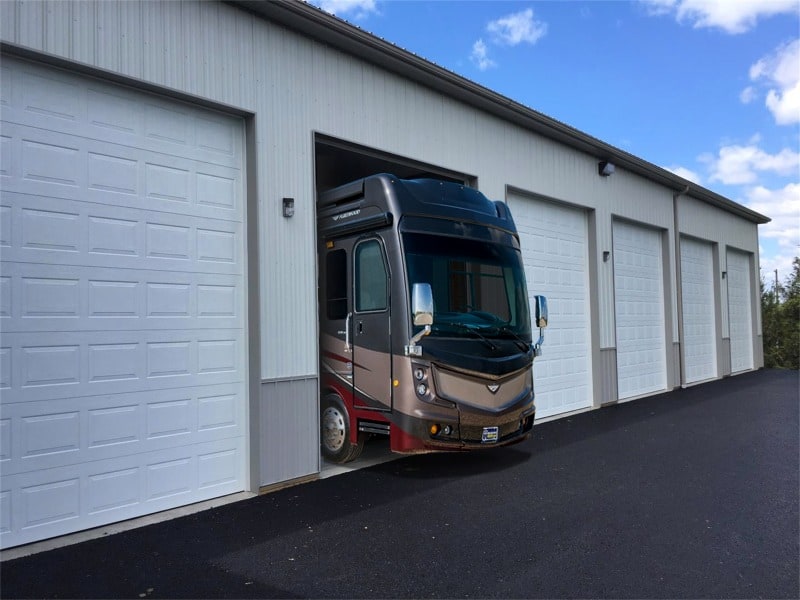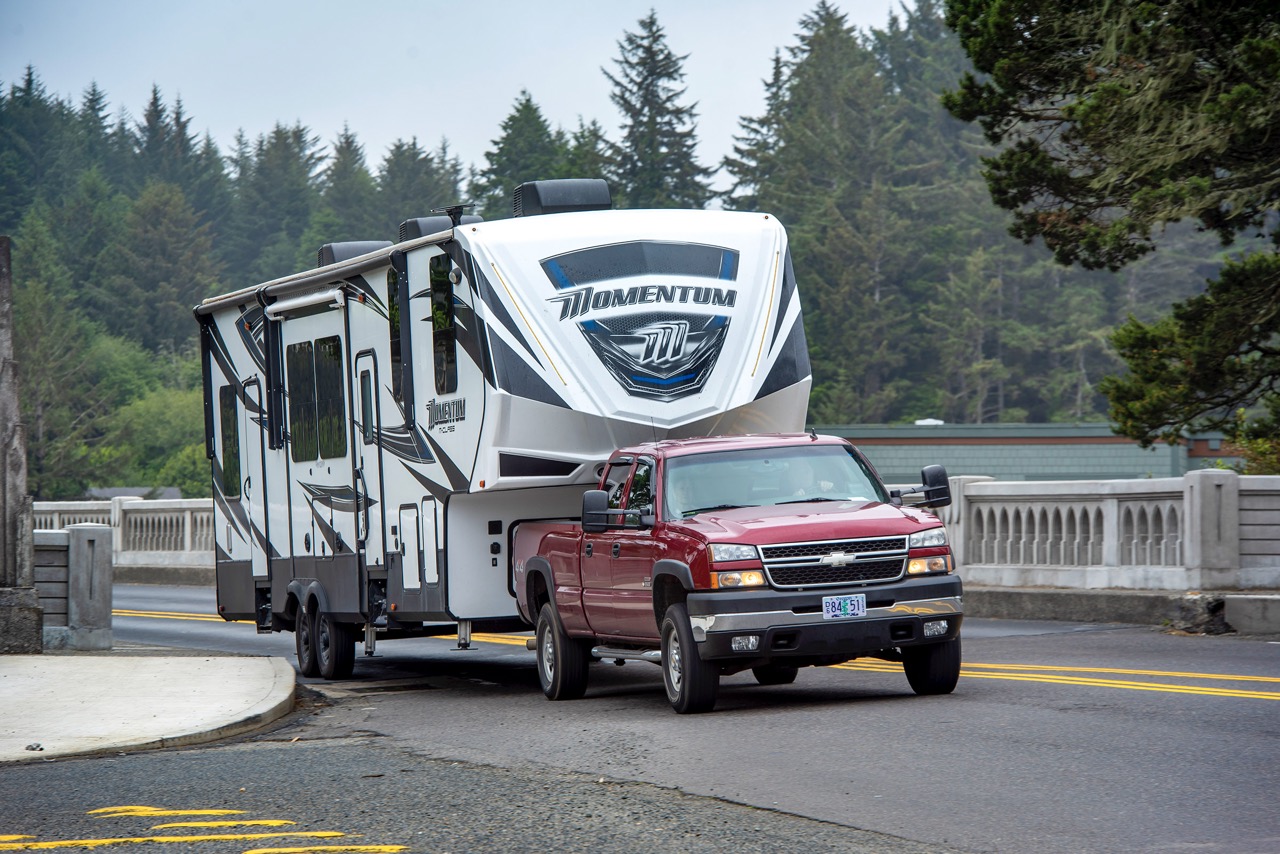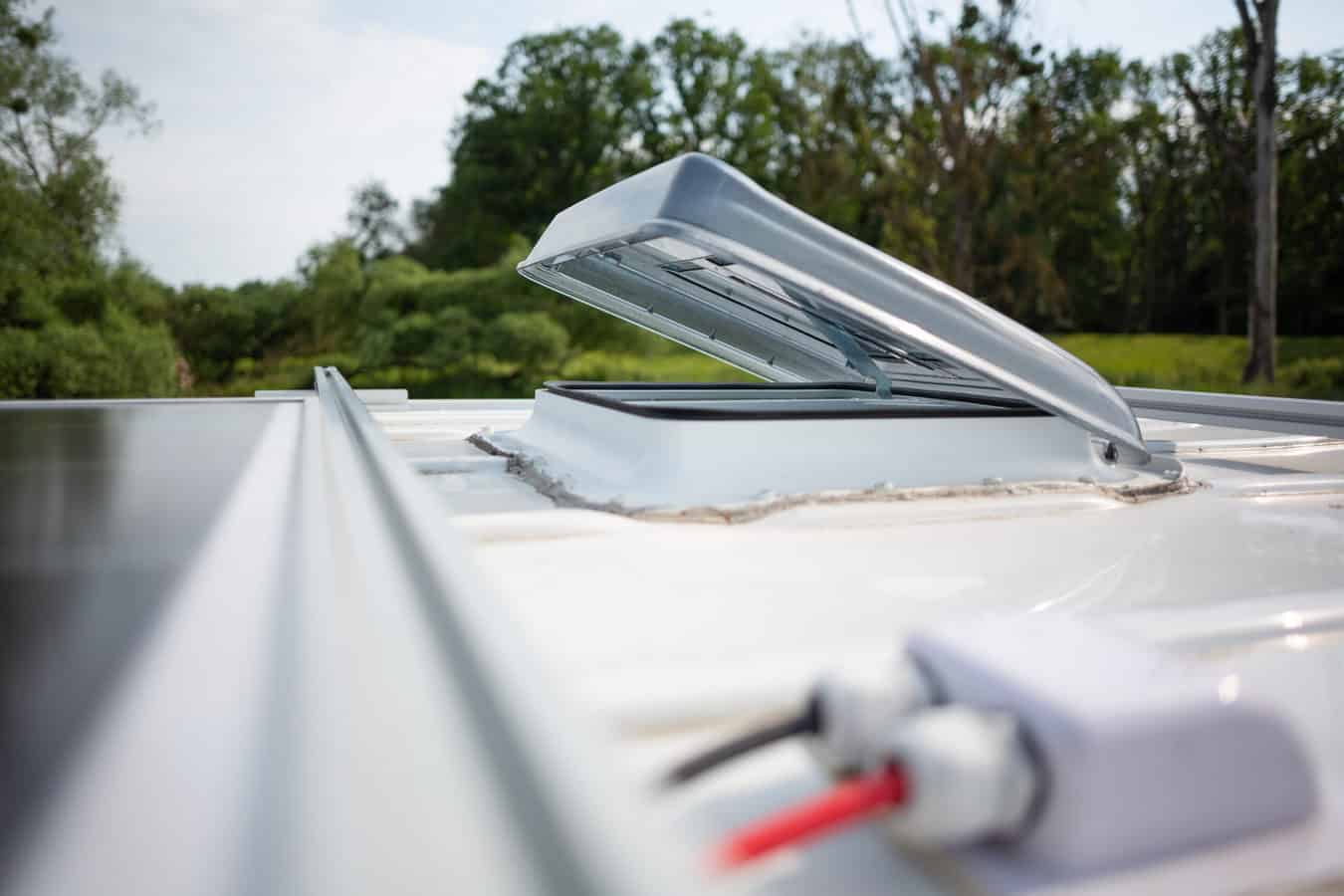
Why You Should Consider Indoor RV Storage
RVs are wonderful, but most people don’t use them all year long. Once the winter weather sets in, it can be tricky to drive a large vehicle on icy roads, so many people put their RVs in storage for a few months. Indoor RV storage is a viable option for many people, but it might seem like an unnecessary expense.
Indoor RV storage typically costs between $100-$400 a month, but this price fluctuates based on a variety of factors. The size of your RV, the length of time it is stored, and additional facility services can impact the price. It is cheaper to store your RV outside or in a garage, but these methods can lead to complications.
Every indoor RV storage facility is different, and their prices will reflect this. In general, you’ll pay a couple hundred dollars for this service. Whether or not this is worth the money depends on the area you live in and the services/prices that the facility has.
Outdoor climate
One factor that will determine whether or not indoor storage is worth it is the climate in your area. If your area experiences extreme temperature changes, this can damage an RV. The constant freezing and thawing can damage the structure and shorten the lifespan of your tires.
If you’re in an area with heavy snowfall, this added weight on the RV roof can cause major structural damage if you keep it outside.
On the other hand, if you live in a mild climate, you’ll probably be okay to forgo indoor RV storage. Southern states are more likely to have mild winters and minor snowfalls that won’t cause problems for RVs.
When you’re considering the climate, don’t forget about the humidity factor! Wet climates can cause rust, water damage, mold, and other humidity-related issues. If you’re in a humid area, indoor RV storage is worth the money because it can be hard to treat these issues once they take hold.
Size of RV
The size of your RV might also be a determining factor when you’re searching for storage options. Indoor storage facilities must be long, tall, and wide enough to accommodate your vehicle. Larger RVs are typically more expensive to store indoors.
For instance, one indoor RV storage facility has pricing that varies based on RV length. Vehicles that were 15 feet long or smaller cost $141, while RVs that were 45 feet long cost $423. That’s a pretty huge range, and it could impact your decision when you’re trying to store an RV.
In general, the smaller your RV is, the cheaper it is to store. Therefore, indoor storage is probably worth the money if you have a little camper.
Length of time
Of course, the amount of time that you need to store your RV will also factor into the price. Some facilities charge a flat rate, while others charge monthly, yearly, etc. If you just need to store your RV for one month or less, it’s probably not worth the trouble of finding storage and paying for it.
But if you require a long-term solution that will keep your RV in good shape, indoor facilities are a great option. The price may be a determining factor, though. The longer you need to store your RV, the more expensive it will be.
Additional services
Some storage facilities offer additional services. These options may include cleaning the exterior, emptying holding tanks, replacing tires, detailing the vehicle, etc. This can be great if you want to give your vehicle some seasonal tune-ups and care, but they’re not always necessary. These services can also increase the price, and you may not be able to opt out of some of them.
Most people can do these services at home, so they’re not really necessary to the indoor storage experience. Therefore, you probably shouldn’t let the inclusion of these perks sway you (unless they’re included in the base price and seem reasonable). For most people, additional services don’t make or break the decision to store an RV indoors.
Alternative storage options
If you don’t choose to store your RV indoors, what are your other options? Fortunately, there are several ways you can store your RV and save money along the way. Some require a bit more effort, but they are all viable options (depending on your budget and the climate in your area).
Outdoor facility storage
Although indoor storage is the big-ticket item, many facilities also provide outdoor storage spaces for a cheaper rate. This is a good option if you still want your RV to be protected but don’t want to pay for the full indoor experience. Many outdoor storage options are covered, so your RV won’t be exposed to snow, rain, or direct sunlight as long as it’s there.
Some spaces may be uncovered for an even lower price. These spots don’t provide much protection, but they do give you a place to keep your RV when you’re not using it. These large vehicles can be hard to keep at your house, especially if you don’t have enough yard/street space to accommodate it.
Store outside at home
If a facility isn’t a viable option for you (due to price or distance issues), you can also consider storing your RV at home. If you have an open spot on the street outside your house or a yard that’s big enough to fit it, these are great places to keep your vehicle.
You will have to put in more work if you choose this option, though. Your RV will need to be properly covered and winterized to prevent any damage during the storage period. All water must be drained, the interior and exterior should be regularly cleaned, and you’ll need to find ways to decrease humidity/moisture buildup.
Pests and mold can take over an RV that isn’t properly winterized, and these can both cause major problems down the road. If you do keep your RV outside when it’s not in use, consider buying a carport to provide some protection from the elements. These are fairly cheap and will protect your RV from some amount of rain, snow, and UV damage.
Garage storage
Finally, you can keep your RV inside a garage (assuming you have one that’s big enough). Some people build custom garages or sheds to house their vehicles when they’re not being used. This is a great solution because you get the benefits of indoor storage options without paying anyone. Your RV gets the full protection of a roof, as well as some level of temperature/humidity control.
Unfortunately, this option isn’t viable for everyone because it’s hard to find garages that are big enough to house an RV.
Final thoughts
Indoor RV storage isn’t worth it for every RV owner, but it does provide some useful benefits. If you live in an area with a particularly harsh or humid climate, indoor storage will extend the lifespan of your vehicle.
If money is an issue, you can always store the RV at home, but it will take more work. So, ultimately, the decision depends on how much time or effort you want to spend to ensure your RV stays in good shape during its storage season.
One of the best parts about RVing is engaging with the community of traveling enthusiasts. iRV2 forums allow folks to chat with other RVers online, and get other perspectives on everything RVing, including products, destinations, RV mods, and more.
Related articles:





Can someone please recommend an indoor storage area near Daytona FL?
You forgot the most overlooked reason for paying storage. In most municipalities it is not legal to just plop your RV out on the street for storage. Public streets are not public storage!
HOAs often restrict where/how you can store your RVs.
Always factor storage costs into your decision to purchase one of these money pits.
We cannot store our 5th wheel at home. But we lucked out: found an indoor facility that is heated to 45 degrees in the winter. We keep it there year round. Costs $850.00. The owner pulls it out with a forklift whenever we need it, and puts it away when we get home. He washes it when we request for a small fee. I was not prepared for the value of keeping it out of the sun – the caulking lasts much longer.
We found in interesting and flattering for you to publish our Club storage facility as you photo lead.
We are a 10 acre location just on the Tenn Georgia border ( Chattanooga Tn) Exit 1 on I 75 at the Tenn welcome station We have now 50 over night sites (adding 30 more 2023), 34,000 square feet of cover storage, and 14,500 square feet of Club storage.
When we started the project, I want to establish the relationship we found in the Marina’s here in Chattanooga and not stuck is a dark warehouse. A place where our storage clients could us the RV for the weekend without going anywhere. A place where we provided monthly services, so when you got there your RV was ready to roll. And we have done just that.
I do not believe that you got your pricing and services quite correct in the article. Its not as simple as you made it out and services to play a critical part. Check our web site out hawkinspointe.com
You make some strange and faulty assumptions.
“…this price fluctuates based on a variety of factors. The size of your RV, the length of time it is stored, and additional facility services can impact the price.”
You left out the most important determining factor — location. RV storage is basically real estate — the price is going to vary widely, just as housing costs do, based on your geographic area. And these differences are even more than the factors you listed. For instance, where I live, outdoor storage often runs near $400 a month, while indoor storage is much more.
“If money is an issue, you can always store the RV at home…”
No, you can’t always store the RV at home. Apartment dwellers don’t have any RV parking space. And even those of us with houses often have space restrictions or HOAs that don’t permit RV parking. You even alluded to this earlier:
“These large vehicles can be hard to keep at your house…”
So I don’t understand why you would say “you can always store the RV at home”.
Indoor well worth it at trade or sale time
One added benefit of indoor storage is security. Catalytic converters are easily removed from Motorhomes stored outdoors.
I have stored my fifthwheeler in my canopy. It’s open on both ends and the climate in tennesse is probably ok. I think it’s well protected from the elements and tennesse doesn’t get much snow but it does get a little cold in the winter. It’s also protected from the sun. The base of the canopy is concrete so I also have protection from any moisture getting into the bottom of the trailer. It’s on my property so there’s no rental fees( lol).
Is that ok to store the fifthwheel that way? Thanks.
I store our 38′ DP indoors, climate controlled at 60 degrees, we live where the temps can get in the teens and I didn’t want to deal with winterizing. My question is should I still empty my fresh water tank and hot water heater if we wont be using the coach for most of the winter? Our coach is all electric with an Oasis system, is there anything I should do to protect that system during a long storage season? Is there any other items I should take care of if we aren’t going to use for a few months? Thanks…
Stale water develops a strong odor over several months of storage. Said odor gets into all the pipes. We learned that the hard way. It seems essential to empty your fresh water tank and hot water heater for storage. We have adopted the procedure of emptying in the fall, and sanitizing in the spring. It takes a little time but saves a huge headache.
Assuming one has the space, at $350/month storage, one could potentially build and pay for a 20’x40′ post frame metal building for a garage. It would pay for itself in 4 years (assuming your financing). Ours cost $16,800 complete, turnkey including concrete slab. Only widh we had built larger. Just a thought.
Hey George, you should include your contact information. I’ve been looking around and that’s a good price for a turnkey setup.